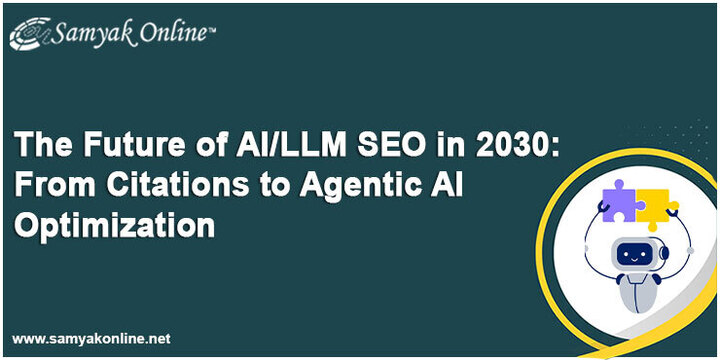The Future of AI/LLM SEO in 2030: From Citations to Agentic AI Optimization
AI systems are moving from answering to acting. Google’s AI Mode is already testing workflows that locate bookable restaurant tables and is expanding toward ticketing; this is the “agentic” future- Google: AI Mode adds agentic, personalized features -assistants that narrow options and then perform tasks. Your content needs to be actionable (availability, pricing, structured offers), not just informative.
For a full foundation, see our AI SEO, LLM SEO and GEO guide
Short Video: Future of AILLM SEO in 2030
What will LLM SEO look like by 2030?
It evolves from optimizing for citations to optimizing for selections within AI workflows. You won’t just want to be quoted; you’ll want to be chosen as the restaurant, event, product, or service the agent nudges the user to book.
Phase shift: From LLM citations → agentic select
What’s changing under the hood?
Search-augmented LLMs combine retrieval with reasoning. “AI Mode” and similar surfaces trigger follow-ups and inject links for deeper reading; 2025 coverage shows Google enabling reservations discovery and soon tickets-the skeleton of transactional assistants.
- Structured actions: (Offer/Action/Reservation schema) become as important as FAQ/Dataset.
- Eligibility: (clean inventory, location, compliance) determines if an agent can select you.
- Trust: (reviews, brand reputation) becomes a gating factor, surfaced inline.
The durable building blocks (still true in 2030)
- Semantic SEO and Entity optimization: LLMs reason over entities; maintain consistent Organization/Person/Product/Service schema and sameAs mappings across LinkedIn, Wikidata, Crunchbase.
- Q&A and tables: Answer blocks and table summaries remain the most extractable shapes.
- E-E-A-T you can prove: Real authors, real case studies, precise citations.
Why confidence matters: Independent testing in 2025 found differences in AI tool accuracy; Google’s AI Mode and ChatGPT performed strongly, but hallucinations persist-clear sourcing helps you get selected and keeps you selected as systems evaluate reliability.
New levers for an agentic world
What content/data will agents prefer to act on?
Actionable, machine-readable offers.
| Lever | What to provide | Why it matters in 2030 |
| Offers/Reservations | Price, availability, location, time windows | Agents can filter and route users |
| Schema for actions | Offer, AggregateOffer, Reservation, Service, Product | Enables eligibility and comparisons |
| Policies & constraints | Cancellation, SLA, compliance notes | Agents avoid options that create risk |
| Post-purchase content | Setup steps, returns, warranties | Agents favor options with smooth completion |
Example: “Book a 60-minute SEO strategy consultation in Delhi this Friday after 3pm.” Agents will shortlist providers exposing slots (via schema/API), pricing, and location-and with trusted profiles.
Will there still be clicks in 2030
Short version: Yes, but fewer. Pew (2025 already shows click rates nearly halved when AI summaries appear (8% vs 15%); by 2030, agentic flows will send fewer but higher-intent clicks to pages where conversion UX matters more than ever.
Your response:
- Invest in conversion rate optimization and post-click speed now.
- Shorten forms, enable one-click callbacks, and surface pricing transparently.
Content that wins “agentic selection”
Recipe: Answer + Evidence + Action.
- Answer: 40 – 80 word definition or recommendation.
- Evidence: References (authorities, standards), case stats, Dataset schema for key figures.
- Action: Clear Offer/Reservation/Service schema, visible next steps.
Why it works: It aligns to the agent’s objective: “Can I stand behind this choice?”
Guardrails, governance, and robots.txt for AI
How do we control what models ingest?
Publishers increasingly use robots.txt directives to allow/deny AI crawlers (e.g., OpenAI’s GPTBot) and Google-Extended by Google token for Bard/Vertex/Gemini training. These controls don’t rewrite history, but they’re part of content governance.
- Blocking GPTBot or Google-Extended is technically simple via robots.txt, though strategic trade-offs apply (visibility vs control).
- The broader ecosystem is still in flux; many publishers block AI bots, while others partner to allow access.
Key Takeaways
- By 2030, LLM SEO is about being selected in agentic flows-not merely cited. Early signs are visible in AI Mode’s booking/ticketing discovery.
- Structure data for actions (Offer/Service/Reservation) and keep entities and evidence tight.
- Expect fewer clicks but hotter intent-invest in CRO and post-click experience.
- Manage AI training exposure with robots.txt directives like GPTBot and Google-Extended-balance reach vs control.
Ready to make your site agent-ready? Explore LLM SEO and AI visibility services along with Schema Services, CRO Optimization, and Semantic SEO Services for a full 2030-proof stack.
About the Author (Samyak Jain)
Samyak Jain leads AI SEO at Samyak Online. He helps brands move from “get cited” to “get selected” by designing actionable, agent-ready content with schema, entity hubs, and high-conversion UX.


Leave a Reply
Want to join the discussion?Feel free to contribute!